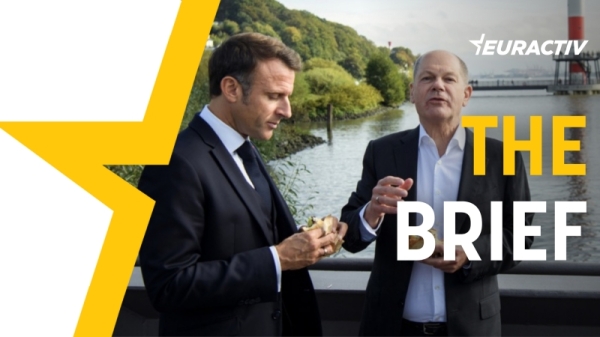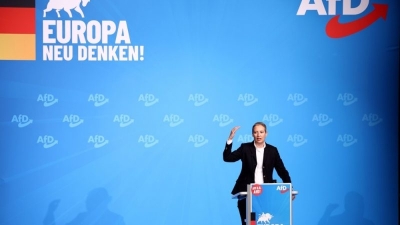The Brief – How broken is the Franco-German engine?

Relations between France and Germany have entered an ice age under President Emmanuel Macron and Chancellor Olaf Scholz, an unprecedented state of affairs that contrasts sharply with the iconic photo of Francois Mitterrand and Helmut Kohl holding hands at Verdun in 1984.
France and Germany had many things in common over the years when the notion of the “Franco-German engine of the EU” was widespread.
Today, one thing they have in common is the fact that both Scholz and Macron are unpopular. The German chancellor is held responsible for the poor state of the German economy, and the French president is held responsible for successive waves of social protests.
However, bilateral relations have significantly deteriorated recently in the context of European efforts to help Ukraine fight Russian aggression.
Who started first, and who crossed the line?
Was it Scholz who blasted France without naming it when he berated allies over “insufficient” support for Ukraine? Or was it Macron who blamed allies for cowardice, again, without naming Germany?
At a time when the US has become unpredictable and unreliable, the need for a consensus between Paris and Berlin is of utmost importance.
After Macron made the surprising “boots on the ground” in Ukraine comment, it was Scholz who said that there would be “no ground troops, no soldiers on Ukrainian soil sent there by European countries or NATO states”.
“Boots on the ground is not an option for Germany,” German Foreign Minister Boris Pistorius repeated the next day.
In Prague, Macron doubled down and said it was time for Ukraine’s allies to step up, adding that “we are surely approaching a moment for Europe in which it will be necessary not to be cowards”.
He seemed to target Germany when he said that “many of those who are saying ‘Never, never’ today were the same ones who said ‘Never tanks, never planes, never long-range missiles’ two years ago”.
This happens, of course, in the context of the Taurus long-range missiles controversy, with Germany officially refusing to send a few dozen to Ukraine.
To add insult to injury, Russia caught German officers discussing the potential use of Taurus missiles to destroy the Kerch bridge, linking Russia to Crimea, and published minutes of what was meant to be a classified discussion.
To understand this mess, one must be aware that France and Germany function differently and that the German chancellor cannot commit to anything not agreed by his three-party coalition. In contrast, the French president decides like a monarch under the Westphalian system.
At the same time, it appears that Scholz’s SPD is particularly reluctant to deliver Taurus missiles despite mounting pressure from his Green and liberal coalition partners to greenlight it.
Also, the SPD remains entrenched in a pacifist post-‘Ostpolitik’ style, as the legacy of the SPD’s statesman Willy Brandt, who stood for rapprochement with the East in the 1970s, lives on.
Anything perceived as warmongering on behalf of the government would boost far-right AfD to the detriment of an already weakened and disparate ruling coalition.
Due to the spat between Scholz and Macron, Green Foreign Minister Annalena Baerbock went to Paris on Monday to meet with her French counterpart Stéphane Séjourné and reignite the Franco-German engine.
The German Greens are often seen in Paris as a more reliable partner, and Baerbock is more closely aligned with Macron on many foreign policy issues.
Macron has a different horizon, there is time until the 2027 presidential election, and he could achieve both a geopolitical and national victory if he regains the political space of Gaullism that far-right leader Marine Le Pen also covets.
Gaullism is primarily based on decreased dependence on the US, opposition to a bipolar global order, and the guarantee of France’s sovereignty without resorting to allies whose interests might not coincide with those of Paris.
But how credible is Macron, who not so long ago argued that the West should not humiliate Putin?
There is a noticeable change in Macron’s tone vis-à-vis Russia, which may indicate a specific reason for his new attitude, most probably something that cannot be communicated, not even to allies such as Germany. Perhaps this irritant will be unveiled after some time.
It often happens that allied capitals differ in their views. But France and Germany should sort out their differences quickly and discreetly, especially in such a tense geopolitical environment.
Unfortunately, this is not happening, nor does it appear to be on the horizon.
The Roundup
Delegates at the European People’s Party’s (EPP) congress in Bucharest officially elected EU Commission President Ursula von der Leyen on Thursday to become the party’s lead candidate for June’s European election.
The European Court of Justice found on Thursday the Belgian association IAB Europe’s consent system for auctioning personal data in breach of the EU’s General Data Protection Regulation.
The European Parliament’s trade committee rejected all of the amendments backed by farming groups on the proposal to suspend import duties and quotas on agricultural products from Ukraine, paving the way for a swift adoption of the decision at the EU level.
The fate of the EU corporate due diligence law (CSDDD) rests in French and Italian hands ahead of a Friday member states’ vote on a heavily diluted draft, in what some say is the last chance to save the file before the end of the current mandate.
The European Centre for Disease Prevention and Control (ECDC) warned that there is a need for action to address the significant rise in sexually transmitted infections (STIs) in the EU/EEA.
Since 2018, French banks have granted more than five billion dollars in loans to the tobacco industry, according to a report by the investigative organisation Profundo, commissioned by the French Alliance Against Tobacco (ACT) and published on Wednesday.
The EU remains heavily reliant on animal feed and fertilisers imports from outside the bloc, as highlighted in a recent study commissioned by the European Parliament’s Agriculture Committee (AGRI).
France’s request for the EU’s Ukraine war fund to include a ‘buy-European’-clause when countries purchase armament together keeps complicating member states’ efforts to find an agreement on the file before the next EU summit on 21-22 March.
A bid to include more livestock farms under the scope of European Union rules to curb industrial emissions faces uncertainty as centre-right MEPs could obstruct the approval of the draft legislation during a final vote at the European Parliament next Tuesday.
Lastly, to stay on top of the latest EU election news, check out this week’s action-packed EU Elections Decoded.
Look out for…
- Commissioner Thierry Breton receives Austrian Labour and Economy Minister Martin Kocher on Friday.
- Commissioner Breton receives Hungarian Economy Minister Márton Nagy on Friday.
- Commission President Ursula von der Leyen in Cyprus meets with President Nikos Christodoulides on Friday.
- Annual Conference of Commission’s Legal Service on Friday.



